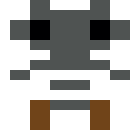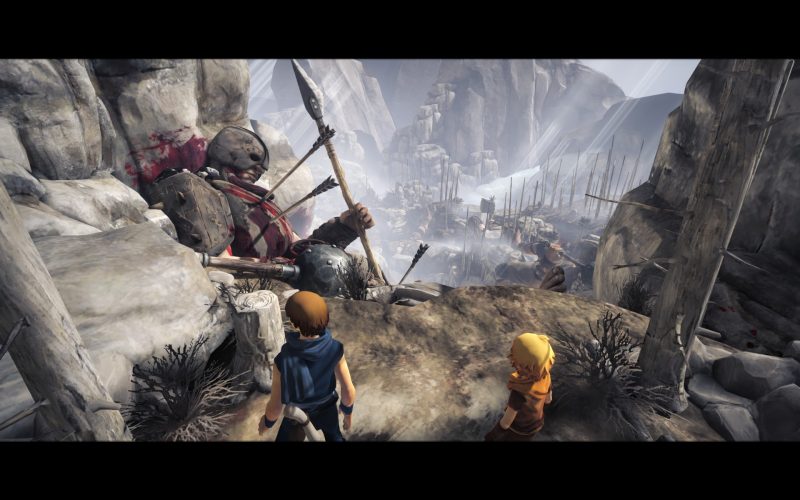I’m struggling to find a suitable comparison for the emotional climax of Brothers – A Tale of Two Sons but I’m going to give it a shot. Anyone who has played the game will know what I’m talking about. For anyone who has not, this is the spoiler warning.
A punch in the gut? A bucket of ice water dropped on an unsuspecting victim? A child’s first realization that the world is not always just? None of it really captures the shock and subsequent horror, outrage and grief of that scene.
To recap: At the end of a long journey, our titular duo arrive at their destination, a tree that supposedly holds a cure for their dying father. Due to a stab wound inflicted by a giant spider in a previous cut scene, the older of the brothers, Naja, collapses against the trunk of the tree. The younger (I’m gonna say Maij?) is sent off on a solo mission to gather the magical healing juice. When he returns, his brother has expired. Maij is then tasked with burying Naja before the game continues.
The portrayal of the death and it’s aftermath caught me off guard. Utterly and absolutely. I put down the controller and had a good, long, cathartic cry. The week after, buying the soundtrack off of Bandcamp, I repeatedly got something in my eye. Writing this, a good two weeks after, and I’m still fighting back the tears
Game character deaths are commonplace. Why does this one feel so poignant?
The obvious answer would be that the characters are just that loveable. That the game’s portrayal of them inspire more attachment and so the loss is felt all the more acutely. It is true that developer Starbreeze manage to make the two boys come into their own as characters using only body language and a fictional Simlish-sounding language. However, I don’t think the characterization extends much further than a slightly generic younger-older sibling relationship where the former is the prankster and the latter the responsible one. It is a sweet portrayal that never feels saccharine but Naja and Maij inhabit roles, both narratively and mechanically, more than they ever become fully fleshed out characters. And if anything, it is Maij rather than Naja, that gets a chance to show off his personality thanks to his license for tomfoolery. In short, I don’t think Naja is that special that he and he alone can explain what’s going on here.
Playing with expectations
The game starts out on a curious note: Despite an awfully bleak background – a mother dead, a father with one foot in the grave, and a perilous journey with uncertain outcome – there is no mistaking the sense that we’re off on a grand adventure. The story follows the standard hero’s journey arc in general but feels inspired by Tolkien in particular (beware the spider lady!) and the opening is no exception. While the cause is as serious as can be, the road goes ever on and on and the mood is one of caution mixed with hope and curiosity about what’s to come.
This leads to an unspoken covenant with the player: Everything will be alright. This might not be a romp but it’s a well known type of story. It is a coming of age story set as an adventure. People going on adventures grow as people. They come back wiser and maybe sadder but they come back. Bilbo returned, right? As did Frodo. And they were technically adults. Supporting cast may fall by the wayside (nice knowing you, Sean Bean) but not the main characters, especially not those who are in the process of coming-of-age.
The game as a whole certainly allows the player to believe this – or suspend his or her disbelief, depending on outlook and attitude. The music and the visuals never quite let go of an undertone of melancholy – that cello, those sepia tones – but the dead/sick parents provide a handy explanation for that. And the game also has plenty room for joy and excitement. Beautiful vistas and soaring strings abound. The boys often respond to the player’s proddings and the story’s developments with whooping and laughter. Limbo this is not.
Maybe even more than the graphics, the gameplay physics informs us that this is not such a cruel world after all as they are as accomodating to the brothers’s progress as could be hoped for. Having mounted mountain goats you don’t so much ride as float over mountaintops. While rope climbing each brother easily carries the other’s weight and inertia and gravity are basically on vacation. The boys are tossed like ragdolls over walls and chasms without any sense of risk to life or limb. The player can fail some of these challenges but the boys can’t be hurt.
Of course there are elements of thematic foreshadowing. As you traverse the various levels the tone grows darker and death makes multiple appearances: The griffon, the hanged girl, the giants fallen in battle. Still, the boys pass through all this seemingly untouched. Even towards the end, while drenched in blood and facing off against a scary cult in the middle of a sacrifical ritual, the boys aren’t cracking, rather cracking up and making silly ghost noises.
The net result is that the game world does not convey any true sense of danger. Despite a few offscreen deaths (represented by fading the screen to black) when you misjudge the mechanics, this sets up assumptions about invulnerability and makes the sudden twist all the more brutal and surprising.
So we like Naja and didn’t see it coming, is that it? I don’t think that’s all. I, for one, didn’t shed any tears for Robb Stark.
No more magic solutions
The German sociologist Max Weber used the the term “Entzauberung der Welt” to encapsulate the modern processes of rationalization and bureaucratisation. It literally means the disenchantment of the world, as in the act of making magic leave the world. I’m reminded of it not because Brothers calls for sociological analysis but because Entzauberung a) ironically sounds wonderfully magical to the non-German ear (say it out loud and you can hear the fairy-dust-sprinkling sound effect playing) and b) Entzauberung of a different kind is exactly what happens when Naja dies.
When Maij reenters the scene where he left Naja cropped up against the tree, my reaction closely mirrored that of the younger boy: Disbelief followed by futile attempts to use the magic healing tree juice to revive Naja. Because that’s what video games sets us up for: Child logic. When in the context of fantasy video games have we ever been taught that generic panaceæ cannot cure haemorrhaging resulting from stab wounds?
However, the world of Brothers has been disenchanted. Magical solutions no longer suffice. This applies to the aftermath as well. No feeling person would just leave Najas corpse to the animals and the game does not resolve the issue for us by the magic of cut scenes or fade outs. He has to be buried and there is noone to do that but Maij and the player. All mechanical interactions so far have made use of handily placed mechanical-magical implements but here the game does not come to our aid. So we use our hands to dig. And use interact-move to pull the corpse to into the grave. And interact with four earth mounds to push earth on top it.
It’s absolutely horrible and brilliant. All the dreamy problem solving abstractions – helpful giants, flying machines, goat floats – of previous stages are gone. They are suddenly revealed as the imaginary, playtime mechanics that they are. The puzzles were easy-breezy and we were off to the next one almost immediately because that’s what childhood play is: Impossible obstacles overcome in the blink of an eye.
Working in a kindergarten, I remember telling a bunch of kids, eager for playground assignments, a longwinded story about a dragon. I charged them with going off on an adventure, over the hills and far away, find it, track it down yadi yadi yadi. I put thought and heart into that little improvised tale, all in the service of wanting some quiet time to drink my coffee. Off they charged… and were back in minutes, declaring “job’s done” and asking what was next.
Back in the game, we’re out of one-click abstractions. No grown up giants are here to do the most grown up job of all. There are no wondrous, semi-magical contraptions to assist us, not even a lowly shovel. There is only dig, drag, and shove. The same buttons the player has become use to thinking of as magic problem solvers degenerate into mere human hands with no superpowers but the power to push and shove and rage at the injustice of it all.
This is the end of childhood boiled down to a coarse essence: disenchantment. The world isn’t magic; it’s uncaring and dangerous. The sudden change with what has gone before highlights just how stark the contrast is. It works because we realize that the game never lied to us about the danger inherent in the world (see: parents, roadside littered with corpses, etc.) No, we just bought into the idea of the grand adventure, we saw it the way Maij (and to a lesser extent, Naja) saw it, when really we should have known better. But convincing us to adopt the protagonists’ rose-tinted view of their world allowed us to be shocked the way they are shocked.
No more magic? True, we’re still flying home on the back of a giant bird but hey, if Tolkien could not think of another literary device to shortcut the tediousness of the return trip I’m not going to hold lifting it against Starbreeze.
The final act shows Maij’s personal growth by letting him overcome his signature fear of water stemming from his first hand experience of his mother’s drowning. It channels Naja’s spirit to help Maij grow into his new adult role that sees him as the comforter of his father. It’s a nice note to end on. Compared to the starkness of the preceding scene, it does however feel a bit pat.
The end
Inevitably this works for some people and others not so much. Quite apart from more or less efficient narrative mechanics that can be taken apart and analyzed, a lot of the impact is to do with personal matters. I’ve had sibling fallings out where I’ve lost people for months, even years. My parents are getting older and though the prospect of being left behind is still far off, it is no longer a mere hypothetical. It is something we have to talk about. Just like Maij’s, it is a scary role to contemplate. For these reasons the issues in Brothers continue to resonate and resonate a lot louder than most games.

